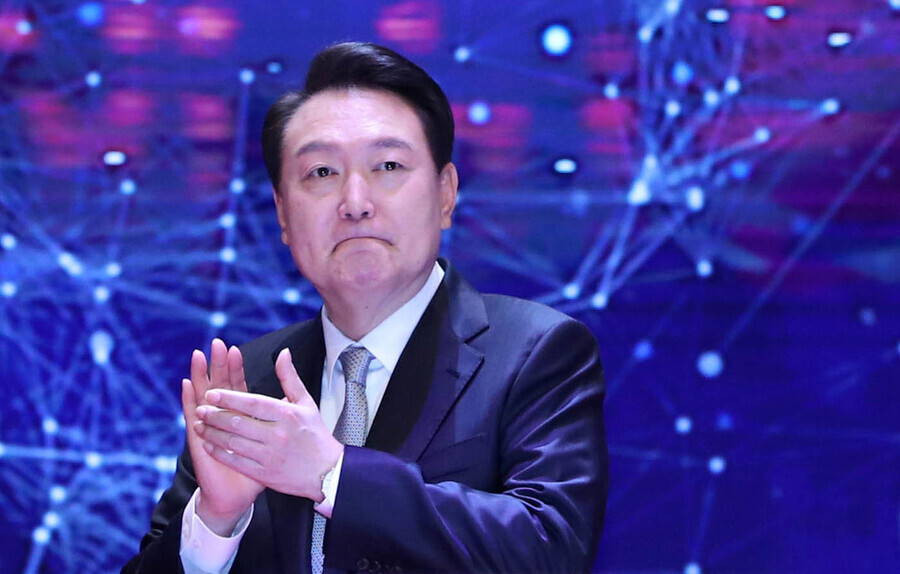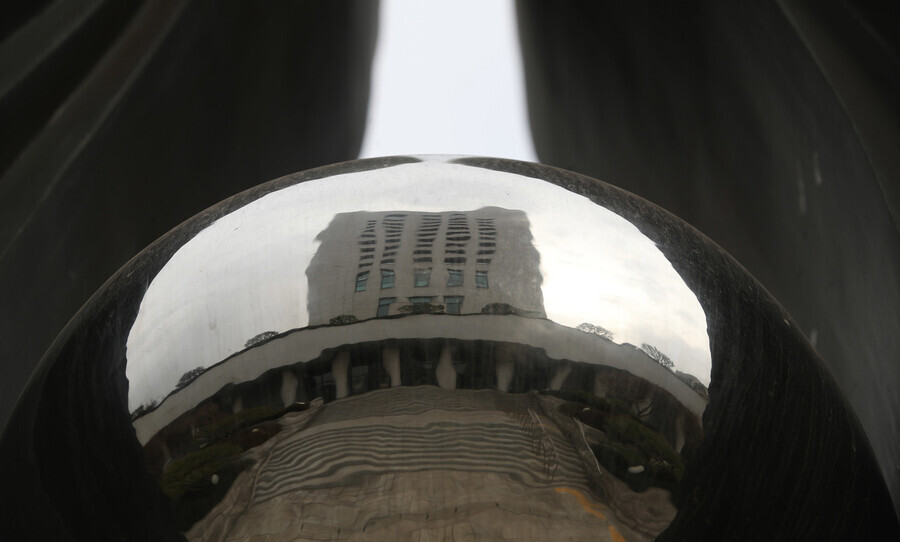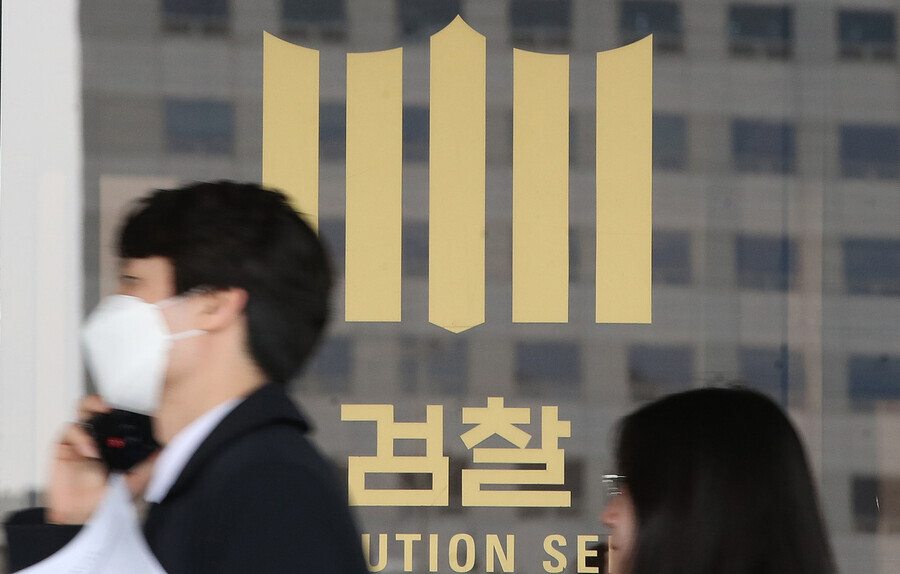hankyoreh
Links to other country sites 다른 나라 사이트 링크
Tracing year one of Yoon’s rampant prosecutor cronyism

The fears of South Korea becoming a republic ruled by prosecutors voiced after Yoon Suk-yeol took office as president have taken just one year to turn into a reality.
A year after Yoon’s election, prosecutors can be found occupying every sort of official government position, as the state’s management system has been taken over by the rigid organizational logic of oneness with the prosecution system.
The selection process for official positions — including everything from nomination to vetting and appointment — now lies fully in the hands of former prosecutors, seemingly ruling out the possibility of rational discussions or external checks.
This structural backdrop has ended up reinforcing a sort of “inbreeding” system among former prosecutors. Among politicians and legal professionals, it is feeding fears that the prosecutorial appointments could breed chaos in state affairs.
In its investigation Wednesday, the Hankyoreh found that former prosecutors have been employed across nearly two dozen institutions.
They include the presidential transition committee formed shortly after Yoon’s election in March 2022, along with the offices of the president and prime minister, the National Intelligence Service (NIS), the Ministry of Justice (MOJ), the Financial Supervisory Service (FSS), the Anti-Corruption and Civil Rights Commission, and the Ministry of Patriots and Veterans Affairs.
If the current prosecutors dispatched to various agencies are also included, the total increases to around 70 former or current prosecutors working in government positions. Thirteen of them occupy ministerial or vice-ministerial positions, including Minister of Justice Han Dong-hoon; Minister of Land, Infrastructure and Transport Won Hee-ryong; Minister of Unification Kwon Young-se; Minister of Government Legislation Lee Wan-kyu; FSS Governor Lee Bok-hyun; and Minister of Patriots and Veterans Affairs Park Min-shik.
A common thread shared by the prosecutors occupying prominent positions in the administration is their personal connection with Yoon himself. A case in point is the example of Peaceful Unification Advisory Council Secretary General Seok Dong-hyeon, who has known Yoon for 40 years since their time as classmates in the 1979 incoming class at the Seoul National University law college.
Commenting on a controversial recent government decision on the issue of forced labor mobilization during the Japanese occupation, Seok asked, “What other formerly colonized country besides South Korea continues even today to demand an apology and compensation?”
Minister of Government Legislation Lee Wan-kyu was a classmate of Yoon’s at the Judicial Research and Training Institute, as well as a special connection who provided representation in a criminal case involving Yoon’s mother-in-law and in Yoon’s own case to have disciplinary action against him overturned.
Also notable is the presence of individuals connected to Yoon through work with the Supreme Prosecutors’ Office (SPO). This has triggered a controversy over the issue of former prosecutors monopolizing key positions, including members of the so-called “Yoon Suk-yeol division” identified early on in his term.
Examples of this include FSS Governor Lee Bok-hyun, a “junior” member of the Yoon team who worked with him on an investigation into NIS online election interference, and Kim Nam-woo, director of planning and coordination for the NIS, who as head of the Seoul Central Prosecutors’ Office first criminal division was effectively South Korea’s “national chief prosecutor” during Yoon’s time as director there.
Another member of the Yoon team is former NIS planning and coordination director Cho Sang-joon, whose connection to Yoon dates back to a 2006 investigation into the Lonestar “dumping” case as part of the SPO’s central investigation department.
As an attorney, Cho handled first lady Kim Keon-hee’s case involving alleged Deutsch Motors stock price manipulation, prompting some observers to view his appointment as a “reward for services rendered.”

In the case of the presidential office — whose members provide Yoon with up-close assistance — virtually the entire SPO lineup from Yoon’s time as prosecutor general has been transplanted in.
Lee Won-mo, the senior presidential secretary for personnel affairs, was an SPO researcher while Yoon was prosecutor general. Yoon Je-soon, the senior secretary for administrative affairs whose history of sexual indiscretions raised some controversy, was director of the SPO management support division during Yoon Suk-yeol’s time as prosecutor general.
Personnel planning officer Bok Doo-kyu and personal secretary Kang Ui-goo also worked with Yoon respectively as SPO secretary general and secretary to the prosecutor general.
Lee Si-won, the secretary for civil service discipline who was demoted in connection with the manufacturing of espionage charges against Yu Woo-sung, was also found to have served as “general dining director” while meeting with Yoon at the Daegu High Prosecutors’ Office after the latter’s demotion in the wake of the NIS internet post investigation.
Ju Jin-woo, senior secretary for legal affairs, came from the prosecutors after investigating the Ministry of Environment “blacklist” case. After Yoon declared his presidential run, Ju worked as an aide in his election camp.
Chung Sun-sin, an attorney who was recently appointed head of the Korea National Police Agency’s National Office of Investigation only to have to bow out over revelations of his son’s history of bullying behavior in school, worked as human rights oversight officer for the Seoul Central District Prosecutors’ Office during Yoon’s time as director there.
Predictably, the MOJ includes a number of members from Yoon’s team, most notably Minister of Justice Han Dong-hoon, who is one of Yoon’s closest associates.
As part of its declared push to disentangle the MOJ from the prosecution service, the Moon Jae-in administration did not appoint any former prosecutors as justice minister. In contrast, Yoon appointed his “right-hand man” Han to the position within a week of taking office. As vice minister, he named Lee Noh-kong, former director of the Seongnam branch of the Suwon District Prosecutors’ Office, whom he knew from carpooling while working there.
Prosecutors have also been reintroduced to key positions where the Moon administration had attempted to remove them. Former Seoul High Prosecutors’ Office prosecutor Kim Seok-woo was named director of the legal affairs office, while former Namyangju branch director Gu Seung-mo was appointed as legal affairs review officer.
Prosecutors have also taken over some of the division director positions in the MOJ that had previously been held by non-prosecutors. Indeed, human rights bureau director Wi Eun-jin, a member of the group Minbyun-Lawyers for a Democratic Society who had been appointed by the Moon administration, recently resigned, saying that there was “no work” she could do there.

Recently, the administration has expanded the scope of its de facto rule by prosecutors by insisting on former prosecutors for certain positions that would appear to have nothing to do with those duties.
Last month, the Ministry of Health and Welfare (MOHW) appointed Sungkyunkwan University law professor Han Seok-hoon as a full-time advisory committee member for the National Pension Service’s Fund Management Committee.
Han had been chief prosecutor at the Gunsan branch of the Jeonju District Prosecutors’ Office. This marks the first time a former prosecutor has been appointed to the position.
Prosecutor Woo Jae-hun was also dispatched as a policy aide to Deputy Prime Minister and Minister of Education Lee Ju-ho. It is the first time since 2011 that a currently serving prosecutor has been sent to work as a policy aide to a minister of education.
Last December, former investigator for the prosecution service Park Gyeong-o was named as an auditor at Seoul National University Hospital.
The problem is that these appointments aimed at building the prosecutors’ omnipotence are still happening — and expected to continue in the foreseeable future.
When Yoon was named prosecutor general in 2019, he pursued a similar approach of assigning specialized prosecutors from his own “team” to major security- and planning-related posts, regardless of their area of specialization. At the time, this sparked an incident in which around 60 prosecutors tendered their resignations in protest of the overt bias in special investigation department appointments.
“Even when he had no ‘appointment powers’ as director of the Seoul Central District Prosecutors’ Office, Yoon Suk-yeol still filled all the major official positions with his own people,” said a former prosecution service official closely acquainted with the situation at the time.
“He’s the kind of person who only trusts his own,” they added.
The same source added, “There was a lot of criticism at the time over appointment bias, but Yoon paid it no mind. He’s very firm in his approach and doesn’t change readily.”
“I expect to see him continuing to appoint former prosecutors to major government office positions for the foreseeable future,” they predicted.
The general elections to select the 22nd National Assembly are also scheduled to take place in April of next year. Analysts are predicting that many of the former prosecutors who have taken over the Cabinet may make the move into the legislature.
Another issue is Yoon’s “revolving door” system of personnel scrutiny. It’s an approach where a former prosecutor general president appoints former prosecutors while assigning vetting authority to a personnel information management team directed by his close associate, Minister of Justice Han Dong-hoon. In effect, the structure amounts to prosecutors making the recommendations and scrutinizing the choices themselves.
In some cases, this exclusive and insular approach leads to disasters like the case of Chung Sun-sin, who had to step down a day after being appointed as National Office of Investigation director.
By Son Hyun-soo, staff reporter; Jeon Gwang-joon, staff reporter; Kang Jae-gu, staff reporter
Please direct questions or comments to [english@hani.co.kr]

Editorial・opinion
![[Editorial] Intensifying US-China rivalry means Seoul must address uncertainty with Beijing sooner than later [Editorial] Intensifying US-China rivalry means Seoul must address uncertainty with Beijing sooner than later](https://flexible.img.hani.co.kr/flexible/normal/500/300/imgdb/original/2024/0517/8117159322045222.jpg) [Editorial] Intensifying US-China rivalry means Seoul must address uncertainty with Beijing sooner than later
[Editorial] Intensifying US-China rivalry means Seoul must address uncertainty with Beijing sooner than later![[Column] When ‘fairness’ means hate and violence [Column] When ‘fairness’ means hate and violence](https://flexible.img.hani.co.kr/flexible/normal/500/300/imgdb/original/2024/0516/7417158465908824.jpg) [Column] When ‘fairness’ means hate and violence
[Column] When ‘fairness’ means hate and violence- [Editorial] Yoon must stop abusing authority to shield himself from investigation
- [Column] US troop withdrawal from Korea could be the Acheson Line all over
- [Column] How to win back readers who’ve turned to YouTube for news
- [Column] Welcome to the president’s pity party
- [Editorial] Korea must respond firmly to Japan’s attempt to usurp Line
- [Editorial] Transfers of prosecutors investigating Korea’s first lady send chilling message
- [Column] Will Seoul’s ties with Moscow really recover on their own?
- [Column] Samsung’s ‘lost decade’ and Lee Jae-yong’s mismatched chopsticks
Most viewed articles
- 1Xi, Putin ‘oppose acts of military intimidation’ against N. Korea by US in joint statement
- 2For new generation of Chinese artists, discontent is disobedience
- 3[Editorial] Transfers of prosecutors investigating Korea’s first lady send chilling message
- 4[Editorial] Intensifying US-China rivalry means Seoul must address uncertainty with Beijing sooner t
- 5[Column] When ‘fairness’ means hate and violence
- 6How K-pop broke the internet — and broke into the US market
- 7[Column] How to win back readers who’ve turned to YouTube for news
- 8AI is catching up with humans at a ‘shocking’ rate
- 9[Editorial] Yoon must stop abusing authority to shield himself from investigation
- 10‘Shot, stabbed, piled on a truck’: Mystery of missing dead at Gwangju Prison